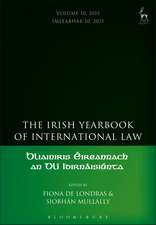The Principle of Subsidiarity and its Enforcement in the EU Legal Order: The Role of National Parliaments in the Early Warning System: Parliamentary Democracy in Europe
Autor Dr Katarzyna Granaten Limba Engleză Paperback – 30 sep 2020
| Toate formatele și edițiile | Preț | Express |
|---|---|---|
| Paperback (1) | 320.25 lei 6-8 săpt. | |
| Bloomsbury Publishing – 30 sep 2020 | 320.25 lei 6-8 săpt. | |
| Hardback (1) | 571.24 lei 6-8 săpt. | |
| Bloomsbury Publishing – 30 mai 2018 | 571.24 lei 6-8 săpt. |
Preț: 320.25 lei
Preț vechi: 391.35 lei
-18% Nou
Puncte Express: 480
Preț estimativ în valută:
61.28€ • 64.28$ • 51.01£
61.28€ • 64.28$ • 51.01£
Carte tipărită la comandă
Livrare economică 01-15 aprilie
Preluare comenzi: 021 569.72.76
Specificații
ISBN-13: 9781509941179
ISBN-10: 1509941177
Pagini: 272
Dimensiuni: 169 x 244 x 19 mm
Greutate: 0.44 kg
Editura: Bloomsbury Publishing
Colecția Hart Publishing
Seria Parliamentary Democracy in Europe
Locul publicării:London, United Kingdom
ISBN-10: 1509941177
Pagini: 272
Dimensiuni: 169 x 244 x 19 mm
Greutate: 0.44 kg
Editura: Bloomsbury Publishing
Colecția Hart Publishing
Seria Parliamentary Democracy in Europe
Locul publicării:London, United Kingdom
Caracteristici
Surveys and analyses the functioning of the new mechanism of subsidiarity review provided by the EU's Early Warning System (EWS).
Notă biografică
Katarzyna Granat is Junior Research Fellow and Marie Curie Fellow at Durham Law School.
Cuprins
Introduction I. Existing Scholarship on the Subsidiarity Principle and National Parliaments II. Research Approach III. Structure 1. The Subsidiarity Principle in the EU Treaties I. Introduction II. Characteristics of the Subsidiarity Principle III. Subsidiarity in Other Legal Systems IV. Subsidiarity in the EU Treaties V. Subsidiarity in the Court of Justice VI. Reasons for Introduction of the EWS VII. Conclusion 2. The Involvement of National Parliaments and the EWS I. Introduction II. The Growing Role of National Parliaments in the EU Treaties III. The Design of the EWS IV. The 'Barroso Initiative' V. The EWS in Interparliamentary Cooperation VI. Conclusion 3. The Scope and Application of the EWS I. Introduction II. Scope of the Reasoned Opinions Under Protocol No 2 III. Comparison of the First Three 'Yellow Cards' IV. Consequences of the 'Yellow Cards' V. Observations on the Practice of the EWSVI. Conclusion 4. Design of the Subsidiarity Review at the National Level I. Introduction II. Institutional Evolution of National Parliaments III. Analysis of Constitutional Jurisprudence IV. Overview of Scrutiny Types V. Comparison of Procedures VI. The Impact of the Ex Ante Subsidiarity Review Design on the Number of Reasoned Opinions VII. Conclusion 5. The EWS Within National Political Systems I. Introduction II. Government, Majority and Opposition in EU Affairs III. Research Approach IV. Analysis of the Data V. Analysis of the Debates VI. Conclusion 6. Principle of Conferral Under Protocol No 2 I. Introduction II. The Question of EU Competence III. Reasoned Opinions Concerning Violation of the Principle of Conferral IV. Special Cases: Article 114 and Article 352 TFEU V. Case Study: The 'Yellow Card' on the Right to Strike Proposal VI. Conclusion 7. Subsidiarity and the Delegation of Power in the EU I. Introduction II. Delegated and Implementing Acts III. Case Study of the Proposal for a Tobacco Products Directive IV. Assessment V. Conclusion 8. Subsidiarity and Fundamental Rights Legislation I. Introduction II. Fundamental Rights in the EU Draft Legislative Acts III. Fundamental Rights in the Reasoned Opinions IV. Case Study of a 'Genuine' Fundamental Rights Proposal V. Scrutiny of Fundamental Rights Proposals Within the EWS VI. Conclusion Conclusion I. Findings of the Book II. The EWS as an Answer to the 'Democratic Deficit' and 'Competence Creep'? III. Outlook: Reform Proposals
Recenzii
Katarzyna Granat's analysis is particularly thorough and addresses numerous aspects of the functioning of the EWS... Granat manages to successfully uncover several dimensions of this issue which had thus far not been examined... The issues considered in the last three chapters - principle of conferral, delegation of powers and fundamental rights - are also particularly original and will undoubtedly be useful for anyone looking at the EWS from now on. These are all but a few of the aspects that should invite scholars interested in parliamentary democracy within the EU to read this monograph.
The evolving role of national parliaments in the EU has led to a wealth of academic literature in recent decades. In this crowded field, Granat's analysis of the early warning mechanism is able to add value and originality, due to its rigorous doctrinal analysis of the reasoned opinions submitted by national parliaments.
Granat's work has significant strengths. Primarily it boasts a remarkable empirical richness, providing the reader with ample footnotes and concrete examples of early warning system applications... Throughout the book, Granat's investigative reasoning is logical and easy to follow. Her comprehensive analysis on each different facet of the early warning system and subsidiarity is truly impressive.
The evolving role of national parliaments in the EU has led to a wealth of academic literature in recent decades. In this crowded field, Granat's analysis of the early warning mechanism is able to add value and originality, due to its rigorous doctrinal analysis of the reasoned opinions submitted by national parliaments.
Granat's work has significant strengths. Primarily it boasts a remarkable empirical richness, providing the reader with ample footnotes and concrete examples of early warning system applications... Throughout the book, Granat's investigative reasoning is logical and easy to follow. Her comprehensive analysis on each different facet of the early warning system and subsidiarity is truly impressive.






















